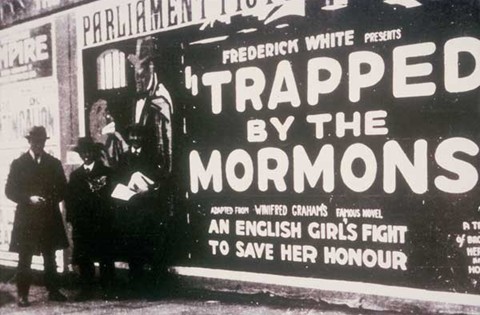To say that the topic of Mormonism has become increasingly popular is an understatement. And as people are discussing Mormons and their behaviors and rituals, people are quickly taking sides. LDS figures in the news media are stirring debate and Americans, especially, are becoming polarized. Despite their fairly unchanging view of the world, Mormons seem to be getting crazier by the second. So why are Mormons so controversial? Why does the tone set by discussions of this religion differ so much from the discussion of Catholicism, Protestantism, Jehovah's Witnesses, Buddhism, etc (Islam not considering)?

Mormons on Parade
Obviously a large factor of the increased heat on the LDS church relates to Mitt Romney. Despite his attempts to make his campaign about something other than his beliefs, he has coaxed out the cavalry. Mormon critics previously content at letting the LDS church be the LDS church feel threatened now that a Mormon may be making important decisions for them. In an environment like a presidential campaign where everything is black and white, good and evil, right and wrong, sane and crazy--there is no way a misunderstood religion like Mormonism wouldn't come under some new fire.
My Dad Warned Me About You Folk
As much as Americans would like to think that they are not swayed by their parents' biases, we all have learned them. Just as many Mormons are raised by Mormon parents who sway and teach them to believe in Jesus Christ, the Book of Mormon, and Joseph Smith, other parents were teaching their kids about the "quacks down the street." Since the 1800's, Mormonism has always been equated with Polygamy (even after the practice was abolished in 1890). Abraham Lincoln himself described polygamy as one of the "twin relics of barbarism," siting the Rupublican platform of 1856. Mormons were portrayed as barbarians and rapists in movies and newspapers. The fact is, that near-sightedness has not died out and many still hold on to the cultish reputation the church received in the 1850's. Especially among other religions, the LDS church represents corruption, perversion, and outright barbarism. Coincidentally most of these religions share a vast majority of common beliefs and practices with these "quacks."
I Was Mormon Once
Interestingly enough, the most intense fear and hatred of Mormons come from former Mormons. This often stems from what they feel is the cause of their dysfunction in society or from having wasted their childhood living a Mormon life-style. The Church of Jesus Christ of Latter-Day Saints (which is the official name of the church) demands a great deal from it's members. Members are to attend 3 hours of church once a week; they are commanded not to smoke, drink alcohol, drink coffee or tea (black and green, not herbal), encouraged to participate in activities and service projects throughout the week, attend the temple. 19 year old males are encouraged (and expected) to serve a 2 year mission, being sent wherever they are needed--this could range from the next state over all the way to Mongolia.
Needless to say, being a Mormon isn't just something you believe, it's something you live; a lot is demanded. So if someone comes to the conclusion that they do not believe in what they've been living their whole life, there is often a "how could you" effect. They've lived their lives under certain assumptions and once that is taken away, they feel as if their world has been turned on it's head. This isn't unique to the Mormon church, this happens as many children grow up and decide to lead a life very different than how they were raised. Being an ex-mormon, however, gives that adolescent life-style a name to point their finger at.
Personal Note
I am an active Mormon, so obviously I have my biases. Having done everything that has been expected of me so far (the mission, the church attending, the temple attending, etc.) there is a conclusion that I have come to. If I were to leave the church tomorrow, I would still be grateful for the experience of growing up in the LDS church. I can assure you that no belief, practice, commandment, expectation, or ritual was ever detrimental to my development as a quality human being. In fact, any person (believer or not) living a Mormon lifestyle would be better off for having done so. Most ex-Mormons I know (and I know and associate with quite a few) are good people, partly because they grew up in a wholesome and enriching way. The ex-Mormons who consistently go out of their way to blame the church for their dysfunction always claim a life so much happier post-Mormonism, yet all I hear is how messed up the church has made them. It isn't new that as people become unhappy or unsatisfied with their life and/or choices they are tempted to blame their parents (not to discredit legitimate parental abuse or neglect). Being raised Mormon gives you something else that's easy to blame. If only Mormons weren't so judgmental I would have been a happier person. Scapegoats are common, a happy childhood is not. Belief aside, a good, healthy, and active life is a happier life.
Here's some fun Mormons:
Friday, September 28, 2012
Why We Fear Mormons
Posted by Tobias at 12:46 PM 0 comments
Labels: ex-mormons, LDS, Mormons
Saturday, July 7, 2012
Real Urges (or, The Babbling Blogger)
Every so often we are reminded how
insignificant we are. We suddenly,
inexorably get the urge to do something more than we are doing. Even if what we do is noble, productive, or
even exhalting. Today I was studying
economics—a means to a financial end—when I got the urge to start writing. I would imagine that most people get urges to
do something other than sit quietly in front of a computer screen and type; my
wife gets these types of urges (more often than I) and they compel her to be
out in the woods or to do something adventurous. My mind wants to create and feel like I am
contributing to our collective thought (somehow adding a philosophical or humorous
paragraph or two appeases these needs, even if no one reads them). As a result, I arrange words into aesthetically
pleasing sentences while paying more attention to grammatical structure than
actual content. Anyone reading this would
attest to that.
In an
effort to afford more substance, I will try to make this concept relatable to
more than just myself and my wife: What urges you? When you are bobbing through your busy day of
productive, yet monotonous activities what calls to you? The library?
The car? The waves? The movie theater (not just for
entertainment, but those who really get inspired by creative cinema will understand
this one)? For my father, it is public
policy. His life is given spice and
wonder if he can convince one person that his opinions of moving towards a
better world are valid. My wife (who thinks
little of humans and more of animals), finds that time spent in nature detaches
her from the greed and thoughtlessness of man and connects her more the sweet
innocence of her favorite creatures.
Now for an
analysis: So What? What does it matter
if I do or do not satisfy my urges to the betterment of my soul? I would say that your real urges are
God-given and, are therefore, a part of exhaltation and eternal progression. Not to be confused with just any urges; these
“real” urges soar above the urges (good and bad) that make up our daily
life. They are the urges that fill the
gaps in our lives—the drive to perfect us.
These are the urges that will eventually lead us to our optimal selves…
our epitome. The utopia of individual
and collective harmony is built on the real urges of the “every so often.”
This is, of
course, assuming that we a.) recognize and follow these urges and b.) want this
desired outcome. Some choose a life of
mediocrity merely because. Because it’s
easy, because it’s fun, because it’s simple: these are all invalid
excuses. Mediocrity may be easy, but
eventually, ease becomes an agonizing burden of self-mutilation. “Fun” also becomes boring and vapid. All of these reasons then rule the “simplicity”
of mediocrity to be just plain wrong.
Simplicity would be to go where these urges lead you, not to fight
against them. At first, it may seem
simple: to simply do nothing. In time,
doing nothing becomes the most costly and un-simple thing to do. There are no valid reasons (besides perhaps
the cunningness of the devil) for a soul to remain mediocre. I therefore restate: some choose a life of mediocrity
merely BECAUSE.
Real Urges are the reason we stop and the reason we think deeply. They are the cause of great discoveries and the inspiration for self-portraits. They can be life-altering motivations or strange daydreams. We are proudly ashamed of them or ashamed to be proud of them.
But what do
I know. I did not plan to write this or
even take much aforethought about this subject.
I was simply following a pleasant urge.
Posted by Tobias at 1:41 PM 0 comments
Labels: feel good, fulfillment, god, mediocrity, perfection, Soul, spirit, urges
Subscribe to:
Posts (Atom)


